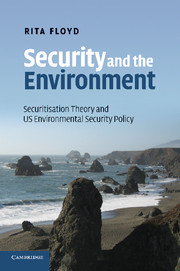Book contents
- Frontmatter
- Contents
- List of tables
- Acknowledgements
- Abbreviations
- Introduction
- 1 The nature of securitisation theory
- 2 A revised securitisation theory
- 3 The rise of US environmental security
- 4 The Clinton administrations and environmental security
- 5 The Bush administrations and environmental security
- 6 The moral evaluation of environmental security
- 7 Conclusion
- Bibliography
- Index
1 - The nature of securitisation theory
Published online by Cambridge University Press: 05 May 2010
- Frontmatter
- Contents
- List of tables
- Acknowledgements
- Abbreviations
- Introduction
- 1 The nature of securitisation theory
- 2 A revised securitisation theory
- 3 The rise of US environmental security
- 4 The Clinton administrations and environmental security
- 5 The Bush administrations and environmental security
- 6 The moral evaluation of environmental security
- 7 Conclusion
- Bibliography
- Index
Summary
Introduction
In Ole Wæver's many writings on securitisation theory there are three recurring as well as puzzling claims that have been left largely unexplained, even though each of them is vital for a comprehensive understanding of the theory. There is, first of all, the unconventional mix of theorists that are said to form the intellectual ancestors of the Copenhagen School. According to Wæver these include, besides John L. Austin and Jacques Derrida, Carl Schmitt and Kenneth Waltz. Aside from the odd reference to one or more of these thinkers, it is, however, not clear what precisely is drawn from them and what in turn this means for the realm of securitisation theory. Consequently, there is some disagreement among those working on securitisation theory whether all of these thinkers are relevant. The conventional wisdom is that Waltz matters primarily for the Copenhagen School's regional security complex theory and the concept of sectors, and not so much for securitisation theory. This is contestable and in what follows I will draw out the important ways in which Waltz matters for securitisation theory too.
Second, Wæver (at least in his published work) has never satisfactorily explained what he means when he refers to his own alternative position as one of ‘post-structural realism’. Considering the philosophical underpinnings of securitisation theory coupled with the lack of explanation one may wonder if this amounts to more than a mere amalgamation of labels.
- Type
- Chapter
- Information
- Security and the EnvironmentSecuritisation Theory and US Environmental Security Policy, pp. 9 - 42Publisher: Cambridge University PressPrint publication year: 2010



